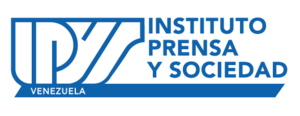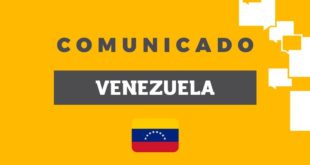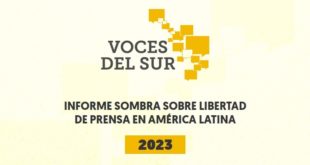El 21 de enero de 2013, se les impidió el acceso a los medios de comunicación a la sesión de la Apertura Judicial, del Tribunal Supremo de Justicia (poder judicial), con sede en Caracas, Distrito Federal. Los equipos reporteriles no pudieron ingresar al auditorio donde se realizaría la actividad que marcaría el inicio de las actividades de las instituciones de justicia del país, y se presentaría la Memoria y Cuenta, informe sobre la gestión del órgano judicial durante 2012.
Juan Francisco Alonso, reportero de la fuente judicial del diario privado El Universal, comentó a IPYS Venezuela que los equipos de prensa de los medios públicos y privados fueron ubicados en un toldo (carpa) habilitado para los medios, en una terraza lateral de la sede del TSJ. En el lugar, los periodistas cubrieron la sesión a través de una pantalla televisiva. Comentó, que a la sala de la sesión sólo tuvo acceso el equipo de cámara de Venezolana de Televisión (VTV), principal medio audiovisual estatal. De igual manera, los periodistas no pudieron entrevistar ni consultar algunas opiniones de los jueces y magistrados que estuvieron en este acto oficial, posterior a la presentación que tenían prevista.
Alonso señaló que las autoridades del TSJ no explicaron las razones de esta medida. Sin embargo, comentó, que en 2012, tampoco se le permitió el acceso a los medios a acto de apertura judicial. En ese momento funcionarios judiciales alegaron que la medida obedecía a una decisión de la oficina de prensa presidencial, debido a que a esa sesión acudiría el primer mandatario nacional Hugo Chávez.
Juan Francisco Alonso, quien tiene 10 años cubriendo la fuente, señaló que esta situación es irregular, debido a que en tiempos anteriores los medios tenían libre acceso a las actividades que realizaban las autoridades del poder judicial.
Solo una pregunta por tipo de medio
Otro incidente sobre el acceso de la prensa a las declaraciones de autoridades públicas, ocurrió el 9 de enero de 2013, cuando la Sala Constitucional (presidida por la máxima autoridad del TSJ, Luisa Estella Morales) presentó la sentencia sobre la interpretación del artículo 231 de la Constitución de la República Bolivariana de Venezuela, en la que el poder judicial concluyó que “no es necesaria una nueva toma de posesión en relación al Presidente Hugo Rafael Chávez Frías, en su condición de Presidente reelecto, en virtud de no existir interrupción en el ejercicio del cargo”. Asimismo, estipulaba que “la juramentación del Presidente reelecto puede ser efectuada en una oportunidad posterior al 10 de enero de 2013 ante el Tribunal Supremo de Justicia, de no poder realizarse dicho día ante la Asamblea Nacional”. Esta situación se generó luego que Hugo Chávez, no pudiera asistir al acto de juramentación y de inicio del nuevo período constitucional, por encontrarse en reposo postoperatorio.
Este día, los medios sí pudieron acceder a la sala donde se presentaría el falló del TSJ, pero representantes de la oficina de prensa del organismo ordenaron que se realizaría una sola pregunta por tipo de medio (impresos, audiovisuales, radio, regionales, internacionales y digitales) debido a que habían acudido muchos equipos de prensa y los magistrados no podían atender tantas interrogantes. Asimismo, los medios debieron esperar por más de tres horas a que se realizara el pronunciamiento de los magistrados, debido a que fueron convocados a las 9:00 a.m., y la presentación se realizó pasadas las 12:00 p.m.
Acceso restringido
El reportero de El Universal comentó, también, que regularmente el TSJ limita el trabajo de la prensa en asuntos judiciales, y que los periodistas sólo tienen autorizado ingresar a la sede judicial cuando el organismo realiza una convocatoria de prensa. Asimismo, los reporteros no tienen la posibilidad de asistir al Tribunal Supremo de Justicia, a realizar de manera libre consultas y diligencias sobre los expedientes judiciales, ni realizar entrevistas a los representantes de este poder público. En las oportunidades que Alonso le ha tocado entrevistar o consultar los archivos, solo lo ha podido efectuar cuando es aprobado por la oficina de prensa y le designan a un funcionario para que lo acompañe.
Etiqueta: limitaciones arbitrarias a la cobertura de asuntos públicos
________________________________________________________________
Lea la versión en inglés
Judiciary power prevented reporter crews from witnessing the rendering of accounts of its public performance
On January 21, 2013, the media was forbidden access to the judiciary´s opening session, the supreme court of justice (TSJ or judiciary power), based in Caracas, federal district. The reporter crews were banned from entering the auditorium where the act that marked the start of activities of the nation´s justice-dispensing institutions would take place, the rendering of the annual state of the union report (called Memoria y Cuenta in Spanish) and the judiciary system´s performance report for 2012 would be presented.
Juan Francisco Alonso, reporter of the judiciary source for private daily El Universal, told IPYS Venezuela that the press crews of the public and private media were placed under a tent on a side terrace of the TSJ´s headquarters. In that place, the journalists covered the session by means of a TV screen. He told us that only the camera crew of Venezolana de Televisión (VTV), the state´s principal audiovisual media, had access to the sessioning room. The journalists were also banned from interviewing or consulting the opinions of the judges and magistrates that attended this official act, at the end of the presentation.
Alonso pointed out that the authorities of the TSJ did not explain the reasons for this measure. However, he mentioned that in 2012, the media were not allowed access to the judiciary inauguration act either. At the time, judiciary officials alleged that this was a decision from the presidential press office, since the nation´s head of state Hugo Chávez was supposed to attend that meeting.
Juan Francisco Alonso, who has covered this source for 10 years, pointed out that this situation is highly irregular, since in the past the media had free access to the activities by the judiciary power authorities.
Only one question per type of media
Another incident regarding access to the press on declarations by public authorities took place on January 9, 2013, when the constitutional court (chaired by Luisa Estella Morales, the maximum authority of the TSJ) presented its decision on the interpretation of article 231 of the constitution of the Bolivarian republic of Venezuela, in which the judiciary power concluded that “it is not necessary for President Hugo Rafael Chávez Frías, as the re-elected president, to be sworn in again by virtue of the non-interruption in the exercise of his mandate”. The court also stipulated that “the re-elected president can be sworn in at a later date than January 10, 2013 before the supreme court of justice, if it cannot be carried out on that date before the national assembly”. This situation occurred after Hugo Chávez was unable to attend the swearing-in act and start of the new constitutional period, since he is completing his post-op treatment.
That day the media were allowed into the room where the sentence of the TSJ was to be read out, but representatives of the entity´s press office ordered that one single question per type of media would be allowed (printed media, audiovisual media, radio, regional sources, international correspondents and digital media) since there were many press teams and the magistrates could not answer so many questions. The media had to wait for more than three hours for the magistrates to make their declaration, since they were called to be there at 9:00 a.m. and the presentation was made after 12:00 p.m.
Restricted access
The reporter of El Universal also commented that the TSJ regularly limits the press´s coverage on legal affairs and that the journalists are only authorized to enter the judiciary office when there is a press conference. The reporters are not allowed to enter the supreme court of justice to freely make consultations and do research with its files and records, nor interview the representatives of this public power. On the occasions when Alonso has had to conduct an interview or consult a record or file, he has only been able to do so when approved by the press office and an official is designated to accompany him.
Label: arbitrary limitations to the coverage of public affairs
 IPYS Instituto Prensa y Sociedad Venezuela
IPYS Instituto Prensa y Sociedad Venezuela



